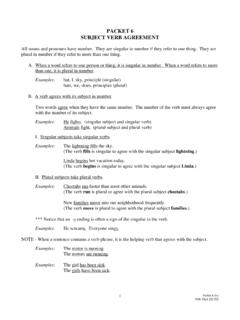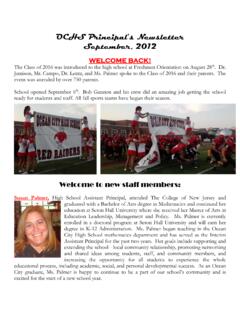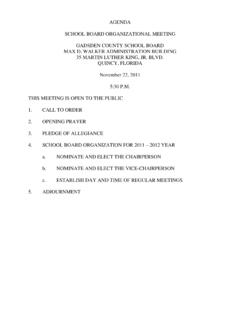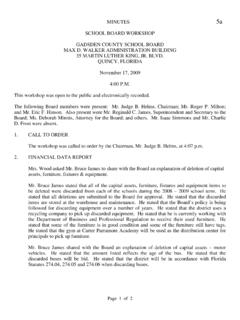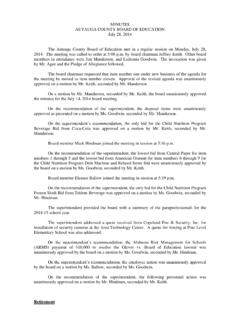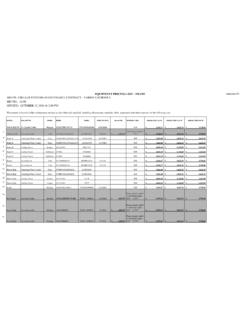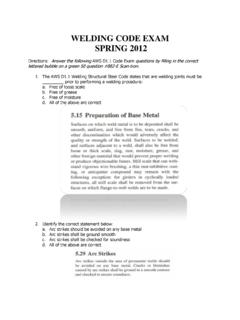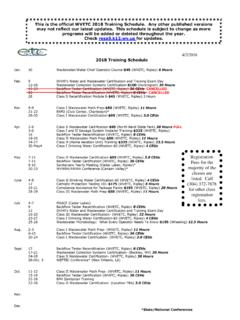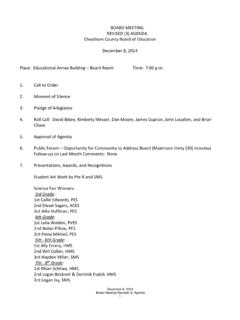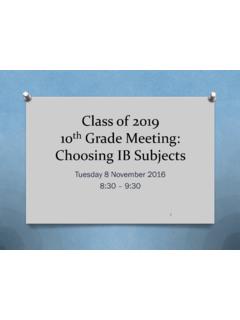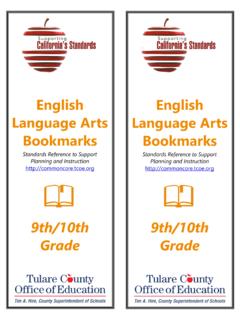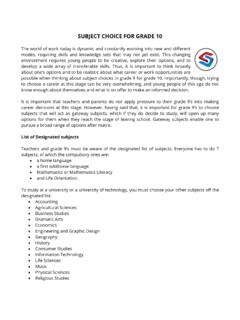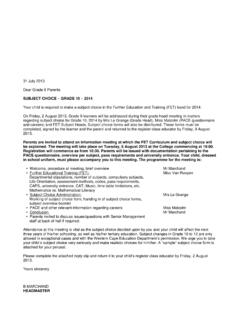Transcription of 10 Grade CP ELA Curriculum Maps - images.pcmac.org
1 10th Grade CP ELA Curriculum Maps NOTE: Students taking 10th Grade CP ELA will complete the following units of study over the course of the school year although not necessarily in the order listed. Unit of Study: The Adventures of Huckleberry Finn Unit of Study: The Catcher in the Rye Unit of Study: Henry IV, Part I Unit of Study: Poetry Unit of Study: Short Stories Unit of Study: The Bean Trees Unit of Study: The Great Gatsby Grade : 10 subject : CP ELA Unit of Study: The Adventures of Huckleberry Finn Big Idea/Rationale The experiences of Huckleberry Finn as the narrator directly ties the novel to the students own lives. Students will identify the effect of 1st person narration, noting how the novel would be radically altered had Twain employed 3rd person voice. Twain is using the character of Huck to demonstrate a particular set of values. The inequalities of pre-Civil War society were not entirely eradicated by the war.
2 This novel is vitally linked to the region in which it is set. The characters of the King and the Duke are meant to represent Twain s explicit criticism of status gained by way of one s bloodline, a rational he also rejected when used to justify slavery. Huck s idealization of the female characters in the novel seems directly tied to his need for a mother figure in his life. Twain has gone on record in saying that this book is a love letter of sorts to his youth, particularly as regards his time spent on and around the Mississippi River. Twain s concerted attacks on American social class divisions are also illustrated through aristocracy such at the Grangerfords & Shepardsons and , all of whom are brutal murderers pretending to be of a higher social stratum. Enduring Understandings Reading comprehension is built on a solid foundation of vocabulary, context, practice, experience, and knowledge of the conventions of genre.
3 Making connections among different pieces of writing leads to greater comprehension and deeper understanding. Writing is a process, not a result. Essential Questions What is Twain emphasizing through the primary values demonstrated by Huck Finn? What comment about the rationale behind slavery is being made through the characterization of Jim? Why is it that the villains of the novel are all white men? Why is Huck presented as continually having to choose between what his heart and conscience are telling him vs. what society deems to be right ? How is this novel an example of Regionalism? What is emphasized by the contrast between Huck and Tom Sawyer? What is Twain saying about society through Huck s idealization of the female characters throughout the novel? How does Jim function as a surrogate father for Huck, in spite of the fact that he is not legally defined as a person ?
4 What are the effects of the specific narrative voice Twain develops through Huck Finn? How is this an example of the picaresque novel? What is the effect of 1st person point of view in this novel? Content ( subject Matter) The Adventures of Huckleberry Finn Standards - Cite strong and thorough textual evidence to support analysis of what the text says explicitly as well as inferences drawn from the text. - Determine a theme or central idea of a text and analyze in detail its development over the course of the text, including how it emerges and is shaped and refined by specific details; provide an objective summary of the text. - Determine the meaning of words and phrases as they are used in the text, including figurative and connotative meanings; analyze the cumulative impact of specific word choices on meaning and tone ( , how the language evokes a sense of time and place; how it sets a formal or informal tone).
5 - Analyze how an author's choices concerning how to structure a text, order events within it ( , parallel plots), and manipulate time ( , pacing, flashbacks) create such effects as mystery, tension, or surprise. - Cite strong and thorough textual evidence to support analysis of what the text says explicitly as well as inferences drawn from the text. - Determine a central idea of a text and analyze its development over the course of the text, including how it emerges and is shaped and refined by specific details; provide an objective summary of the text. - Analyze how the author unfolds an analysis or series of ideas or events, including the order in which the points are made, how they are introduced and developed, and the connections that are drawn between them. - Determine the meaning of words and phrases as they are used in a text, including figurative, connotative, and technical meanings; analyze the cumulative impact of specific word choices on meaning and tone ( , how the language of a court opinion differs from that of a newspaper).
6 - Determine an author's point of view or purpose in a text and analyze how an author uses rhetoric to advance that point of view or purpose. - Write arguments to support claims in an analysis of substantive topics or texts, using valid reasoning and relevant and sufficient evidence. - Write informative/explanatory texts to examine and convey complex ideas, concepts, and information clearly and accurately through the effective selection, organization, and analysis of content. - Develop and strengthen writing as needed by planning, revising, editing, rewriting, or trying a new approach, focusing on addressing what is most significant for a specific purpose and audience. - Draw evidence from literary or informational texts to support analysis, reflection, and research. - Initiate and participate effectively in a range of collaborative discussions (one-on-one, in groups, and teacher-led) with diverse partners on grades 9-10 topics, texts, and issues, building on others' ideas and expressing their own clearly and persuasively.
7 - Evaluate a speaker's point of view, reasoning, and use of evidence and rhetoric, identifying any fallacious reasoning or exaggerated or distorted evidence. - Present information, findings, and supporting evidence clearly, concisely, and logically such that listeners can follow the line of reasoning and the organization, development, substance, and style are appropriate to purpose, audience, and task. - Demonstrate command of the conventions of Standard English grammar and usage when writing or speaking. - Demonstrate command of the conventions of standard English capitalization, punctuation, and spelling when writing - Determine or clarify the meaning of unknown and multiple-meaning words and phrases based on grades 9-10 reading and content, choosing flexibly from a range of strategies. Materials/Resources The Adventures of Huckleberry Finn Notes Grade : 10 subject : CP ELA Unit of Study: The Catcher in the Rye Big Idea/Rationale The Catcher in the Rye is a significant work in 20th Century American literature that provides insight into the experience of an adolescent in the coming of age story of his travels, trials, and reflections, Between leaving boarding school and returning home for vacation, Holden Caufield is forced to confront himself and his past as he searches for answers to the questions in his life.
8 Students will gain an opportunity to evaluate, analyze, and debate the issues facing Holden as they read, write, and participate in class. Enduring Understandings Students will increase reading comprehension. Students will be able to define and identify elements of literature such as character, plots, setting, theme, etc., and their role in fiction. Analysis of character motivation To familiarize students with the form and elements of the picaresque novel. Students will be able to identify the author s use of symbolism to promote theme and character development. Identify the author s comments on the values of post-World War II on American society. Discuss the idea of coming of age in comparison to previously read novels Emphasize and discuss Holden s confusion about sex and sexuality. Identify and discuss Holden s issues with Institutions and the adults that run them. Emphasize the relationship between Holden and his siblings.
9 Reading comprehension is built on a solid foundation of vocabulary, context, practice, experience, and knowledge of the conventions of genre. Making connections among different pieces of writing leads to greater comprehension and deeper understanding. Writing is a process, not a result. Essential Questions What is the reliability of the narrator? What can we deduce about Holden from his canvas assessment of everything as a phony? How are Ackley and Holden alike? How has the death of his brother affected him? How does the death of his brother relate to the departure every year of the ducks? What evidence is there that Holden is confused about sex and sexuality? How does he idealize women? Discuss the importance of children to Holden. How is The Museum of Natural History significant to Holden and the story? Identify and discuss the significance of Phoebe to Holden. What are the most effective techniques are involved in writing research reports, informative/explanatory texts, and arguments?
10 What language choices can a writer make to improve a piece? Content The elements of character and character development ( subject Matter) The elements of the novel The theme of alienation and isolation while coming of age Society and its influence on individuals Standards - strong and thorough textual evidence to support analysis of what the text says explicitly as well as inferences drawn from the text. - Determine a theme or central idea of a text and analyze in detail its development over the course of the text, including how it emerges and is shaped and refined by specific details; provide an objective summary of the text. - Determine the meaning of words and phrases as they are used in the text, including figurative and connotative meanings; analyze the cumulative impact of specific word choices on meaning and tone ( , how the language evokes a sense of time and place; how it sets a formal or informal tone).
